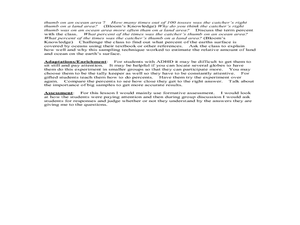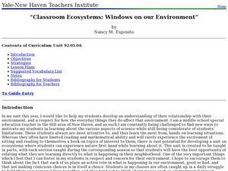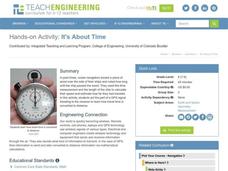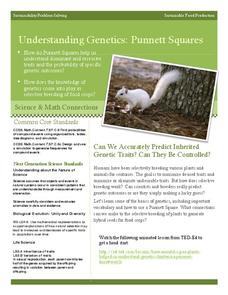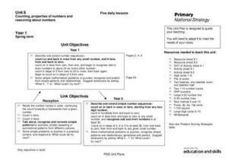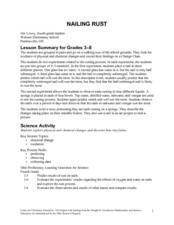Curated OER
What Part of the Earth's Surface is Covered by Oceans?
Third graders investigate oceans. In this Earth science lesson, 3rd graders predict how much of the Earth's surface is covered by oceans. Students determine if their predictions are accurate by throwing a globe to...
Curated OER
How High Are the Clouds?
Students analyze height and collect data to create a graph. In this statistics lesson, students use central tendencies to analyze their data and make predictions. They apply concept of statistics to other areas of academics to make a...
Curated OER
Developing Thinking and Reasoning Skills in Primary Learners Using Detective Fiction
Young scholars are introduced to the genre of detective fiction. Based on their reading level, they are given a different series of books to read. For each story, they are to make predictions and practice decoding messages. To end the...
Curated OER
Graph Creator
Learners rewrite equations using algebraic symbols. In this algebra lesson, students graph linear equations using the slope and y intercept. They make predictions about their graphs and analyze the results.
Curated OER
Mean and Median
Pupils identify the different central tendencies. For this probability lesson, students create the correct type of graphs to analyze their data. They make predictions and draw conclusions from their data.
Curated OER
Classroom Ecosystems: Windows on our Environment
Students in a special education classroom examine their relationship with the environment. As a class, they examine the concept of a web of life and create their own classroom ecosystem. In groups, they record their observations and...
Curated OER
Percentiles
Students analyze the bell curve and make predictions. In this statistics lesson plan, students calculate the percentile to the left of the curve. They then are given the percentile and create the graph from the data.
Curated OER
Probability and Statistics
Students are taught to search the internet for statistics concepts on sports. In this probability instructional activity, students collect data and use the calculator to graph and analyze their data. They graph and make predictions about...
Curated OER
Transformers
Students use transformation to move the graph around. In this geometry lesson plan, students observe transformation of symmetry groups. They use the TI to move the sides of the polygons around and make predictions.
Curated OER
Cell Phone Plans
Students relate the use of a cell phone to math. In this algebra lesson, students collect data on the usage of their phones and plot it. They analyze the graph and make predictions based on the rate per minute.
Curated OER
It's About Time
Students investigate how Global Positioning Systems work and how and why GPS receivers make errors. They graph data points and apply estimation and prediction to real-life GPS situations, discuss time delay, and complete a worksheet.
Curated OER
Graphing Scatterplots
Young scholars examine scatterplots and determine the equation of a line using the slope-intercept method. Students interpret graphs, draw inferences, and sketch a curve of best fit for the graph. Based upon patterns in the graphs,...
Curated OER
Make the Highest Total
Sixth graders predict the outcome of a simple probability experiment, test it and explain the result by using problem solving strategies to explore situations mathematically. They then play a few games informally where students play in...
Western Kentucky University
Understanding Genetics: Punnett Squares
Can scientists really predict genetic outcomes or are they simply making a lucky guess? Scholars first learn about Gregor Mendel and how to make Punnett squares. Then they extract DNA from a strawberry in a lab with included conclusion...
Curated OER
US Airports, Assessment Variation
Determining relationships is all part of algebra and functions. Your mathematicians will decide the type of relationship between airports and population and translate what the slope and y-intercept represent. The problem is multiple...
Curated OER
Counting, Properties of Numbers, and Reasoning about Numbers
Five days of lessons develop number sense and counting patterns, including odd and even numbers, 5s and 10s, doubles, and ways to make 10. Each session opens with fun finger play to reinforce counting and reasoning about numbers. Various...
Curated OER
Nailing Rust
When your upper elementary or middle school class is learning about chemical changes, these activities help demonstrate the concepts. In Part A, they submerge and place a nail partially underwater, then after a week they make...
Curated OER
Balancing The Day Away In Grade 2
Second graders sped the day exploring about balance by playing with and making balancing toys. They discover how varying the amount and position of mass affects the toys' balance. Pupils explore gravity and balance while playing with the...
Curated OER
Investigating Square and Triangle Numbers
Fifth graders build increasingly larger squares and triangles using pattern blocks. They record the growth patterns on a chart and look for corresponding numerical patterns. Students describe the patterns they find and use them to...
Mathematics Vision Project
Module 4: Linear and Exponential Functions
Sequences and series are traditionally thought of as topics for the pre-calculus or calculus class, when learners are figuring out how to develop limits. But this unit uses patterns and slopes of linear functions in unique ways...
Illustrative Mathematics
Tossing Cylinders
Everyone loves a lesson that involves throwing things around! To understand probability, your experimenters will predict how different cylinder-shaped objects will land when tossed. When the data is collected, they will calculate the...
Curated OER
In Touch with Apples
Students read "How To Make an Apple Pie and See the World", the story of a girl who traveled the world to find the ingredients to make her apple pie. They conduct a series of interdisciplinary activities including testing their senses,...
NASA
Rocket Wind Tunnel
Using a teacher-built wind tunnel constructed from a paper concrete tube form, a fan, and a balance, individuals determine the amount of drag their rocket design will experience in flight. Pupils make modifications to increase the...
Curated OER
Geo Jammin' By Design - Day 7, Lesson 38: Kool Cups
Create geometric cups by interpreting directions, informational text, and mathematical concepts. Critical thinkers apply geometric theory (congruent shapes, patterns, symmetry) to actual directions to create a cup that holds Kool Aid....


